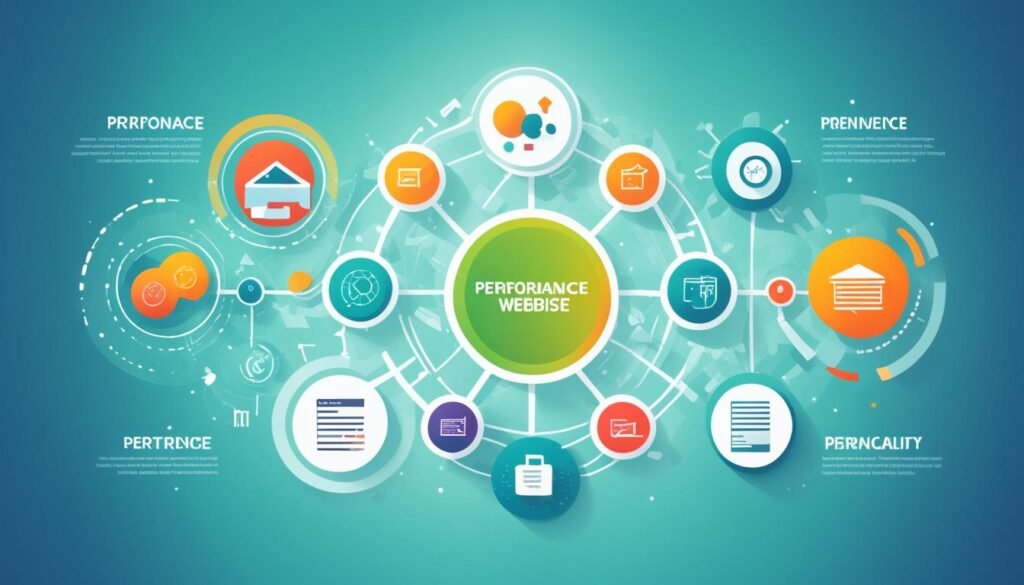Web hosting is a critical factor in determining the performance of a website. The choice of a reliable web host and the type of hosting service can greatly impact factors such as website load speed, uptime and reliability, security, scalability, and support. To understand the significance of web hosting in website performance, it is important to explore different types of hosting plans, factors affecting performance, and how they all contribute to the success of a website.
Key Takeaways: Hosting In Website Performance
- Web hosting plays a crucial role in determining website performance.
- The choice of a web hosting service impacts factors such as load speed, uptime, security, scalability, and support.
- Understanding different types of hosting plans is essential for making informed decisions.
- Factors like server location, caching, CDN, and hardware optimization affect website performance.
- Website load times and bounce rates directly impact user experience and site performance.
The Significance of Web Hosting
When it comes to building a successful online presence, web hosting is a critical factor that should not be overlooked. The right web hosting service can significantly impact various aspects of your website’s performance, ensuring optimal loading speed, uptime and reliability, security, scalability, and support and maintenance.
One of the key aspects affected by web hosting is loading speed. Studies have shown that slow-loading websites lead to higher bounce rates, as impatient visitors navigate away from a site that takes too long to load. This highlights the importance of choosing a web hosting provider that offers fast and reliable hosting services to ensure a seamless user experience.
In addition to loading speed, uptime and reliability are crucial factors in sustaining a successful website. Downtime can result in missed opportunities, loss of revenue, and damage to your brand’s reputation. Therefore, it is essential to select a web hosting service with a high uptime guarantee to ensure your website is always accessible to visitors.
Security is another significant consideration when it comes to web hosting. A reliable web hosting provider will offer robust security measures, such as firewalls, malware scanning, and regular backups, to protect your website and sensitive data from cyber threats.
Scalability is vital for businesses that anticipate growth and expansion in the future. A web hosting service that provides scalable solutions allows you to easily upgrade your hosting plan as your website traffic increases, ensuring that your site can handle higher volumes of visitors without sacrificing performance.
Furthermore, comprehensive support and maintenance are essential for the smooth operation of your website. A reliable web hosting provider will offer 24/7 technical support, ensuring prompt assistance in case of any issues or concerns. Regular maintenance and updates are also crucial for keeping your website secure, up to date, and functioning at its best.
Above all, the significance of web hosting lies in its ability to lay the foundation for a successful online presence. By choosing a web hosting service that excels in loading speed, uptime and reliability, security, scalability, and support and maintenance, you can ensure optimal website performance and provide a positive user experience for your visitors.
Types of Web Hosting
When it comes to web hosting, there are various types of hosting solutions available to cater to different needs and requirements. Each type of hosting offers its own set of features and benefits. Understanding the different options can help you make an informed decision for your website. Let’s explore the most common types of web hosting:
1. Shared Hosting
Shared hosting is a popular and cost-effective option for individuals and small businesses. In shared hosting, multiple websites share the same server resources. This type of hosting is suitable for websites with moderate traffic and resource requirements.
2. Virtual Private Server (VPS) Hosting
VPS hosting provides a balance between affordability and scalability. With VPS hosting, your website is hosted on a virtual server with dedicated resources, providing better performance and security compared to shared hosting. It offers more control and flexibility for websites experiencing growth.
3. Dedicated Hosting
Dedicated hosting is a premium option where you get an entire server dedicated solely to your website. This type of hosting offers maximum performance, control, and security. It is ideal for high-traffic websites, large businesses, and organizations requiring extensive resources.
4. Cloud Hosting
Cloud hosting utilizes multiple servers working together to ensure high scalability, reliability, and uptime. It provides on-demand resource allocation and flexibility, making it suitable for websites with unpredictable traffic patterns or fluctuating resource needs.
5. Managed WordPress Hosting
Managed WordPress hosting is specifically designed and optimized for WordPress websites. It offers automatic WordPress updates, enhanced security measures, and expert support to ensure smooth performance and easy management for WordPress users.
Choosing the right type of web hosting is essential for your website’s success. Consider factors such as site traffic, resource requirements, scalability, and budget when making your decision. Now that we’ve explored the types of web hosting available, let’s dive deeper into the factors that affect website performance in the next section.
Factors Affecting Website Performance

Several factors play a significant role in determining the performance of a website. Effective management of these factors can lead to better website load times, improved user experience, and increased engagement. Let’s explore some of the key factors that impact website performance.
1. Server Location
The physical location of your server can affect the loading speed of your website. A server located closer to your target audience reduces latency and ensures faster access to your content. Consider choosing a hosting service with servers strategically placed in locations that align with your target audience.
2. Caching
Caching involves storing static versions of your website content to reduce server load and improve load times. By caching frequently accessed files and pages, you can minimize processing time and deliver the content to your users faster.
3. Content Delivery Network (CDN)
A Content Delivery Network (CDN) helps optimize website performance by distributing your website’s content across multiple servers worldwide. This reduces the distance between your users and the server, leading to faster content delivery and improved load times.
4. Traffic Management
Effective traffic management techniques, such as load balancing and bandwidth allocation, can ensure your website remains responsive even during high-traffic periods. By distributing incoming traffic evenly, you can maintain optimal performance and prevent server overload.
5. Hardware and Software Optimization
Optimizing server hardware and software can greatly impact website performance. Upgrading hardware components, optimizing server configurations, and keeping software up to date can enhance processing speed, reduce response times, and improve overall website performance.
6. Security Features
Implementing robust security measures is not only crucial for protecting your website but also for maintaining performance. Features like firewalls, SSL certificates, and DDoS protection safeguard your website from malicious attacks and ensure uninterrupted performance for your visitors.
| Factors Affecting Website Performance | Impact |
|---|---|
| Server Location | Affects website loading speed and latency |
| Caching | Reduces server load and improves load times |
| Content Delivery Network (CDN) | Enhances content delivery and load times |
| Traffic Management | Maintains optimal performance during high traffic |
| Hardware and Software Optimization | Improves processing speed and response times |
| Security Features | Protects website and ensures uninterrupted performance |
Optimizing these factors can have a significant impact on your website’s performance, enhancing the overall user experience and driving better results for your online presence. By partnering with a reliable web hosting service that prioritizes these factors, you can ensure the optimal performance of your website.
Server Location and Content Delivery Network (CDN)

When it comes to website performance, two factors play a vital role: server location and Content Delivery Network (CDN). Let’s take a closer look at how these components can significantly impact the speed and accessibility of your website.
The Importance of Server Location
The physical proximity of your server location to your target audience can have a direct impact on the speed at which your website loads for visitors. When your server is located closer to your users, it reduces latency and enables faster access to your website’s content.
For example, if your website primarily caters to users in the United States, it is beneficial to host your server in a data center located in the US. This ensures that the data has a shorter distance to travel, resulting in reduced latency and faster load times.
The Role of Content Delivery Network (CDN)
A Content Delivery Network (CDN) is a network of geographically distributed servers that cache and deliver website content to users based on their location. By storing copies of your website’s files on servers strategically placed worldwide, CDNs ensure faster content delivery to users regardless of their geographical location.
When a user accesses your website, the CDN identifies their physical location and delivers content from the nearest server, reducing the distance data needs to travel. This not only reduces latency but also improves overall website performance and user experience.
CDNs also help manage traffic spikes and distribute the load across multiple servers, further enhancing website responsiveness and availability.
By combining an optimal server location with a robust Content Delivery Network, you can significantly improve your website’s load times, reduce latency, and ensure faster access to your content for users across the globe.
A Quick Comparison of Server Location and CDN
| Server Location | Content Delivery Network (CDN) |
|---|---|
| Physical proximity to the target audience is crucial. | Ensures faster content delivery by caching files on distributed servers. |
| Reduces latency and improves access to website content. | Identifies user locations and delivers content from the nearest server. |
| Optimal for serving localized audiences. | Improves website performance globally, regardless of user location. |
So, whether you prioritize physical proximity or global accessibility, a combination of an ideal server location and a reliable Content Delivery Network can work together to enhance your website’s performance and provide faster access to your content.
Server Resources and Scalability

When it comes to website performance, server resources play a vital role. Factors such as RAM, CPU, and Disk I/O directly impact the speed and responsiveness of your website. Let’s take a closer look at each of these resources and their significance.
RAM (Random Access Memory)
RAM is like a temporary workspace for your website. It stores data that the website needs to access quickly, reducing load times and improving overall performance. The more RAM your server has, the better it can handle multiple concurrent requests and efficiently serve content to your visitors.
CPU (Central Processing Unit)
The CPU is the brain of your server, responsible for executing tasks and processing instructions. A powerful CPU enables faster data processing, resulting in quicker response times for your website visitors. It is crucial to choose a web hosting provider that offers servers with modern, high-performance CPUs.
Disk I/O (Input/Output)
Disk I/O refers to the speed at which data is read from and written to the server’s storage disk. Faster disk I/O allows for quicker retrieval of website files and databases, which directly impacts page load times. Hosting providers that utilize solid-state drives (SSDs) typically offer superior disk I/O performance.
In addition to these server resources, scalability is an essential consideration for website growth. Scalability refers to the ability of your hosting infrastructure to handle increasing traffic and resource demands as your website expands.
Scalability is particularly crucial for websites experiencing rapid growth. Without a scalable hosting solution, your website may struggle to keep up with increased traffic and resource requirements, resulting in slow loading times and decreased user satisfaction.
Choosing a web hosting provider that offers scalability options, such as upgrading server resources or transitioning to a higher hosting plan, ensures your website can easily accommodate future growth without compromising performance.
By optimizing server resources and considering scalability, you can support your website’s growth and provide a seamless user experience for your visitors.
Bandwidth and Traffic Limits

Bandwidth and traffic limits play a crucial role in determining the data transfer rate and overall website performance. These factors are especially important to consider during high activity periods when website traffic is at its peak.
Bandwidth refers to the amount of data that can be transferred between the website and its visitors within a specific time frame. It directly affects the speed and efficiency of data transmission, impacting the website’s load speed and responsiveness.
Traffic limits, on the other hand, define the maximum amount of incoming and outgoing data allowed for a website within a given period. Exceeding these limits can lead to a decrease in website performance as the server may struggle to handle the high volume of data transfer.
During high activity periods, such as seasonal sales or promotional events, websites often experience a considerable increase in traffic. If the bandwidth and traffic limits are not sufficient to accommodate this surge in visitors, it can result in slower load times, reduced website availability, and even crashes.
To ensure optimal website performance during high activity periods, it is essential to choose a web hosting service that offers sufficient bandwidth and traffic allowances to handle the expected increase in visitors. This will help maintain fast load times, ensure smooth data transfer, and provide visitors with a seamless browsing experience.
| Bandwidth | Traffic Limits | Impact on Website Performance |
|---|---|---|
| High bandwidth | High traffic limits | Faster data transfer, quick website load times |
| Low bandwidth | Low traffic limits | Slower data transfer, longer website load times |
Investing in a web hosting plan with sufficient bandwidth and traffic limits is crucial for maintaining high website performance and ensuring a smooth browsing experience for your visitors.
Web Hosting and Website Development

When it comes to website development, reliable web hosting is a key factor in ensuring success. Choosing the right web hosting service can significantly reduce development time and contribute to fast website development. This, in turn, has a direct impact on website load times and bounce rates, ultimately affecting user experience and search engine rankings.
By opting for a reputable web hosting provider, businesses can benefit from advanced infrastructure and efficient server configurations. These optimized hosting environments streamline the development process, allowing developers to focus on creating high-quality websites without being hindered by technical limitations.
Fast website development enabled by reliable web hosting translates to faster load times. This is critical as website load times play a crucial role in user satisfaction and engagement. Studies have shown that a one-second delay in page load time can result in a 7% reduction in conversions and an 11% increase in bounce rates [1]. Therefore, ensuring fast load times through effective web hosting not only enhances user experience but also improves the chances of retaining visitors and achieving marketing goals.
The Impact on Bounce Rates
High bounce rates can be detrimental to website performance and SEO. When visitors encounter slow-loading websites, they are more likely to leave without exploring further. This results in a higher bounce rate, indicating that users did not find the website engaging or valuable.
By investing in reliable web hosting, businesses can significantly reduce bounce rates by providing users with a seamless and enjoyable browsing experience. Fast website load times achieved through a robust hosting infrastructure decrease the likelihood of users bouncing off the site, positively impacting user engagement, conversions, and overall website success.
“Optimizing website load times through reliable web hosting is essential for reducing bounce rates and ensuring positive user experiences.”
In conclusion, when it comes to website development, the importance of reliable web hosting cannot be overstated. From reducing development time to improving website load times and minimizing bounce rates, fast website development facilitated by effective web hosting plays a crucial role in achieving online success.
| Benefits of Reliable Web Hosting for Website Development | Impact on Website Performance |
|---|---|
| Reduces development time | Speeds up website load times |
| Optimizes server configurations | Minimizes bounce rates |
| Provides advanced infrastructure | Improves user experience |
| Ensures efficient web server handling | Enhances search engine rankings |
Note: The table above highlights the direct benefits of reliable web hosting on website development as well as its impact on overall website performance.
Website Load Times and Bounce Rates

In today’s fast-paced digital landscape, website load times have a significant impact on user experience and overall site performance. Studies have shown that a slow-loading website can lead to high bounce rates and visitor abandonment. In fact, according to Google, if a site takes longer than three seconds to load, over half of users are likely to leave.
The speed at which your site loads plays a crucial role in engaging visitors and keeping them on your site longer. A slow-loading site not only frustrates users but also negatively affects your search engine rankings. Search engines prioritize sites that provide a seamless and fast user experience, and slow-loading sites are penalized with lower rankings.
So, what causes slow load times? Several factors contribute to website performance, including server response time, page size, image optimization, and the efficient use of scripts and plugins. It’s essential to regularly monitor and optimize these elements to ensure your site loads quickly and efficiently.
“A slow-loading website can cost you valuable traffic and potential customers.”
To minimize bounce rates and encourage visitors to stay on your site, it’s crucial to invest in optimizing your website’s load times. Here are a few tips to improve site speed:
- Optimize images: Compress and resize images to reduce page size and improve load times.
- Minify and combine files: Minify CSS, JavaScript, and HTML files to reduce their size and merge multiple files into one.
- Utilize browser caching: Enable caching to store static files locally on visitors’ browsers, reducing load times for returning visitors.
- Avoid unnecessary redirects: Minimize the number of redirects on your site, as each redirect adds to the load time.
- Choose a reliable hosting provider: Opt for a hosting service that prioritizes site speed and performance. Look for providers that offer advanced caching mechanisms, content delivery networks (CDNs), and optimized server configurations.
By implementing these strategies and prioritizing fast load times, you can enhance the user experience, reduce bounce rates, and ultimately improve your site’s performance and conversions.
Remember, in today’s fast-paced online environment, visitors have high expectations when it comes to website load times. Don’t let slow-loading sites drive away potential customers and hinder your online success.
- Optimize images: Compress and resize images to reduce page size and improve load times.
- Minify and combine files: Minify CSS, JavaScript, and HTML files to reduce their size and merge multiple files into one.
- Utilize browser caching: Enable caching to store static files locally on visitors’ browsers, reducing load times for returning visitors.
- Avoid unnecessary redirects: Minimize the number of redirects on your site, as each redirect adds to the load time.
- Choose a reliable hosting provider: Opt for a hosting service that prioritizes site speed and performance. Look for providers that offer advanced caching mechanisms, content delivery networks (CDNs), and optimized server configurations.
Final Thoughts
When it comes to website development, reliable web hosting is a crucial factor that can greatly contribute to the overall success of your brand’s online presence. Choosing fast and reliable web hosting services ensures that your website loads quickly, providing an optimal user experience and helping you retain visitors. A slow-loading site can result in high bounce rates and visitor abandonment, negatively impacting your brand’s success.
Moreover, reliable web hosting plays a vital role in the smooth development of your website. It reduces development time, allowing you to launch your website faster and stay ahead of the competition. With fast website development, you can capitalize on opportunities and ensure that your website reflects your brand’s values, aesthetics, and offerings.
To emphasize the importance of reliable web hosting, consider the following scenario:
You’ve spent countless hours and resources in developing a visually stunning and feature-rich website to promote your brand. However, due to slow website loading times caused by unreliable web hosting, visitors are encountering delays and frustration. They might abandon your site and seek alternatives from your competitors. As a result, your brand’s success and reputation suffer, impacting your online presence and potential customer acquisition.
In a highly competitive online landscape, fast website hosting powered by reliable web hosting services is a key differentiator. It ensures that your website is always available, loads quickly, and delivers a seamless user experience. By investing in fast and reliable web hosting, you create a solid foundation for your website’s performance and contribute to the success of your brand.
Benefits of Reliable Web Hosting Services
| Benefits | Description |
|---|---|
| Fast website loading times | Quickly deliver content to visitors, reducing bounce rates and improving user experience. |
| High website availability | Ensure that your website is always accessible to visitors, minimizing downtime and potential revenue loss. |
| Scalability | Easily accommodate website growth and increased traffic without sacrificing performance. |
| Strong security measures | Protect your website and customer data from cyber threats and vulnerabilities. |
| Reliable support and maintenance | Receive prompt assistance and regular maintenance to keep your website running smoothly. |
In conclusion, investing in reliable web hosting is an essential aspect of website development and brand success. By choosing fast website hosting services, you can enhance the performance of your website, provide a positive user experience, and ultimately achieve your online business goals.
What is the Impact of Shared Hosting on Website Load Speed?
Conclusion
In conclusion, web hosting plays a crucial role in the performance and success of a website. The hosting service you choose affects various factors, including loading speed, uptime and reliability, security, scalability, and support. It is essential to make informed hosting decisions to ensure optimal website performance and user experience.
When it comes to website success, every second counts. A slow-loading site can lead to high bounce rates and visitor abandonment. Reliable web hosting with fast load times is vital to keep visitors engaged and improve overall site performance.
Additionally, the choice of web hosting service impacts website development. A reliable hosting provider reduces development time, allowing for faster website creation and deployment. This, in turn, positively influences website load times and bounce rates, contributing to a more successful online presence.
Ultimately, your web hosting decisions can make or break your website’s performance and success. Take the time to research and choose a hosting plan that aligns with your specific requirements and goals. By investing in a quality web hosting service, you can enhance user experience, improve website performance, and increase the chances of overall website success.
FAQs
What is the role of hosting in website performance?
A: Hosting plays a crucial role in website performance as it directly impacts load speed, right web hosting plan selection can significantly influence speed and performance, and the hosting package chosen can affect page load times.
Q: How does web hosting impact website speed and performance?
A: Web hosting affects website speed and performance by determining the quality of the hosting server, the level of optimization offered, the resources allocated to the website, and the overall hosting speed.
Q: Why is choosing the right web hosting provider important for website performance metrics?
A: Selecting the right web hosting provider is crucial for website performance metrics as it ensures that the website has the necessary resources, speed, and support to meet performance goals.
Q: What are some key aspects of website performance affected by hosting packages?
A: Hosting packages impact various aspects of website performance such as the speed of a website, the type of server hosting the website, the shared hosting plan or dedicated server chosen, and the overall hosting speed provided.
Q: How can web hosting impact the speed of a website?
A: Web hosting can impact the speed of a website by determining the resources allocated, the level of optimization offered, the speed of the hosting servers, and the type of hosting plan selected.
Q: What are some ways to improve website speed through web hosting?
A: You can improve website speed through web hosting by choosing a high-speed web hosting provider, optimizing your website for speed, selecting a dedicated hosting plan for better performance, and ensuring that the hosting environment is conducive to fast loading times.
Q: Why is hosting on a website important for its performance metrics?
A: Hosting on a website is important for its performance metrics as it directly impacts various factors such as load speed, server performance, resource allocation, and overall website speed and performance.




